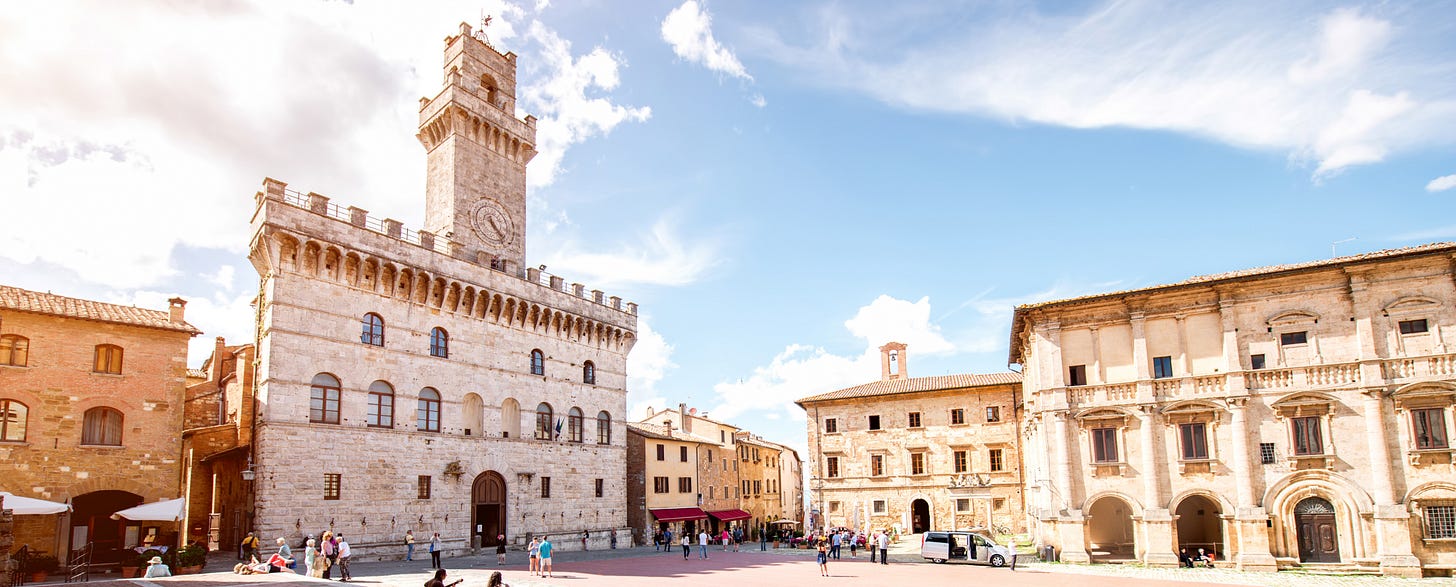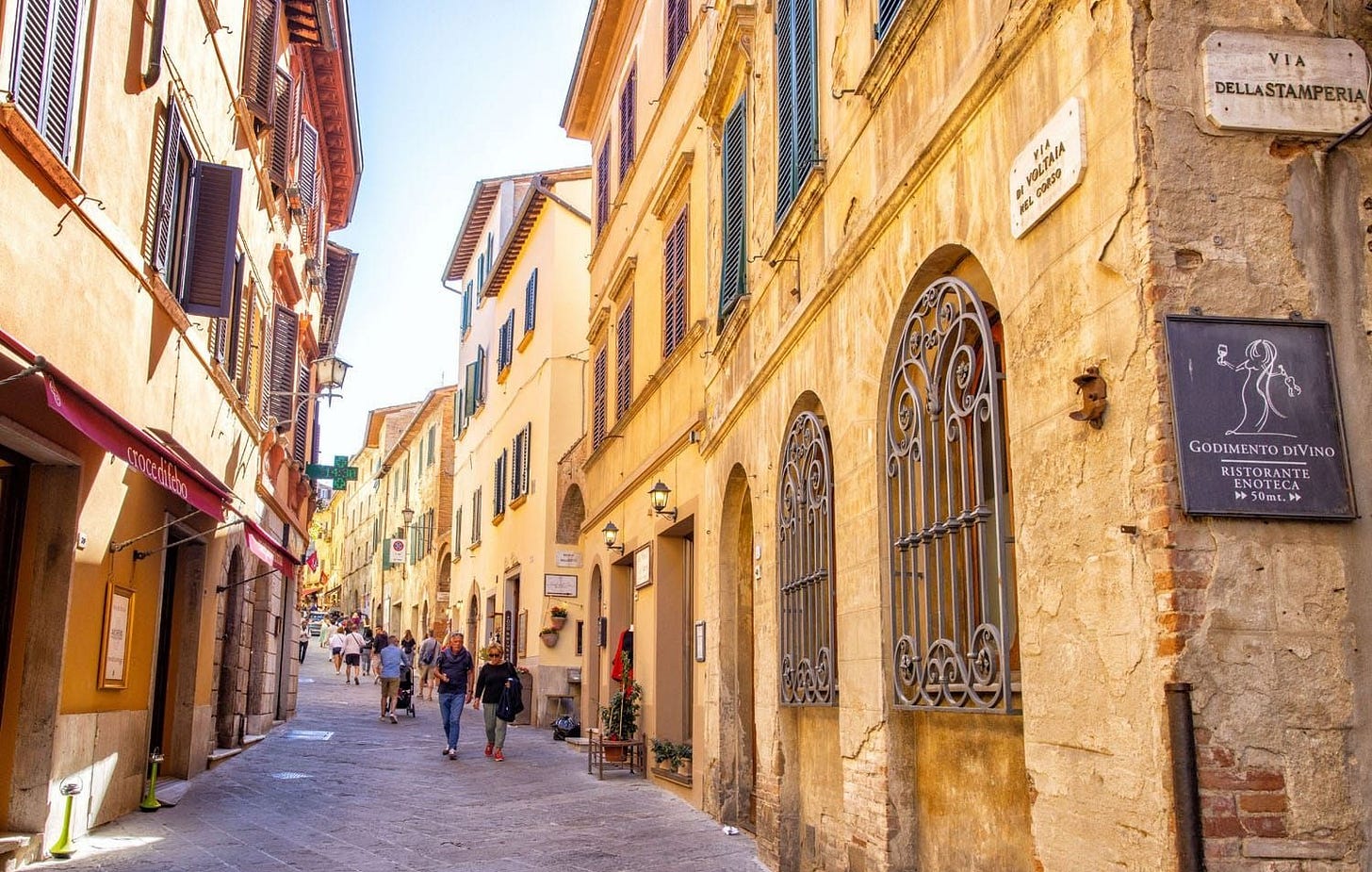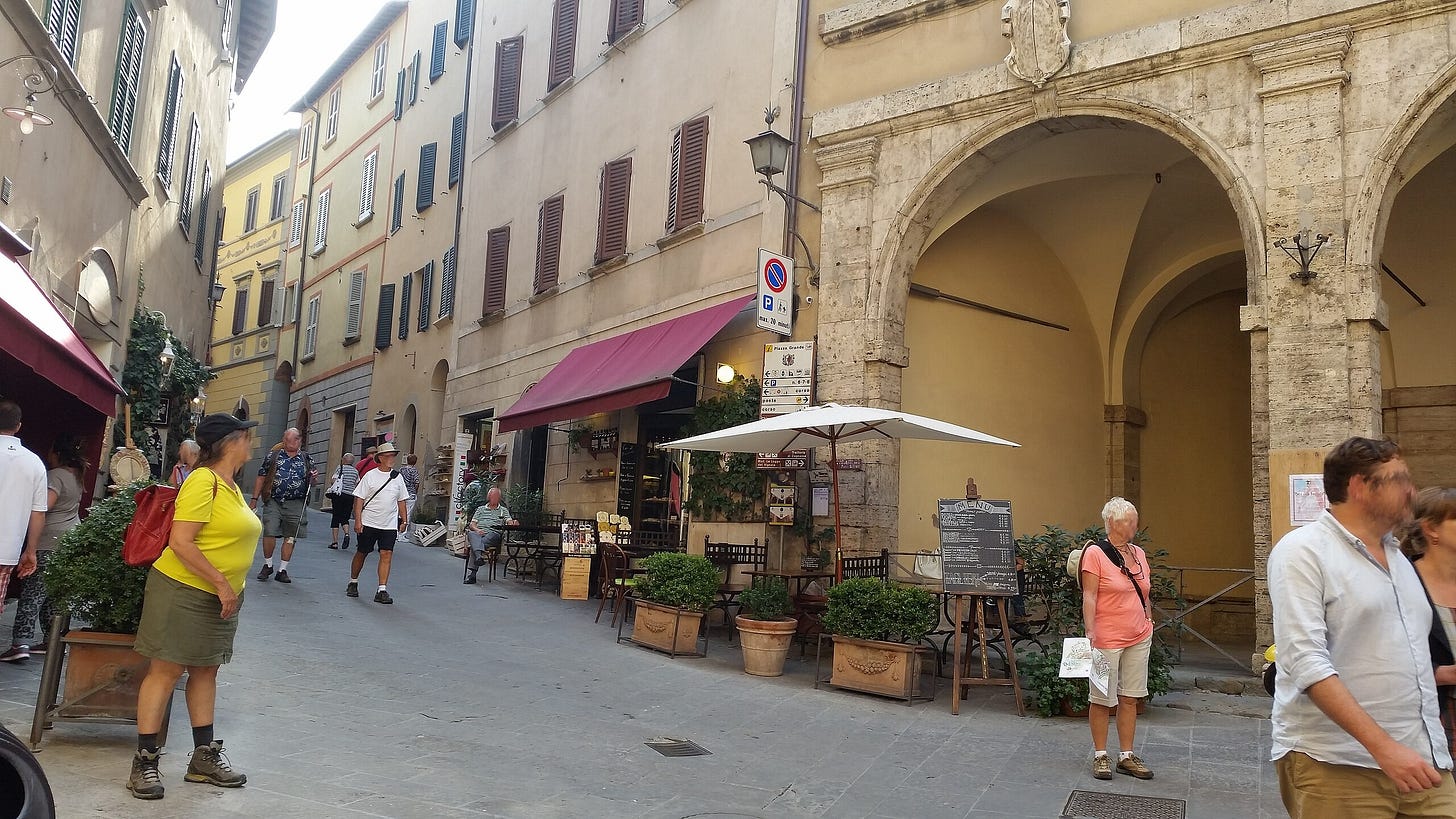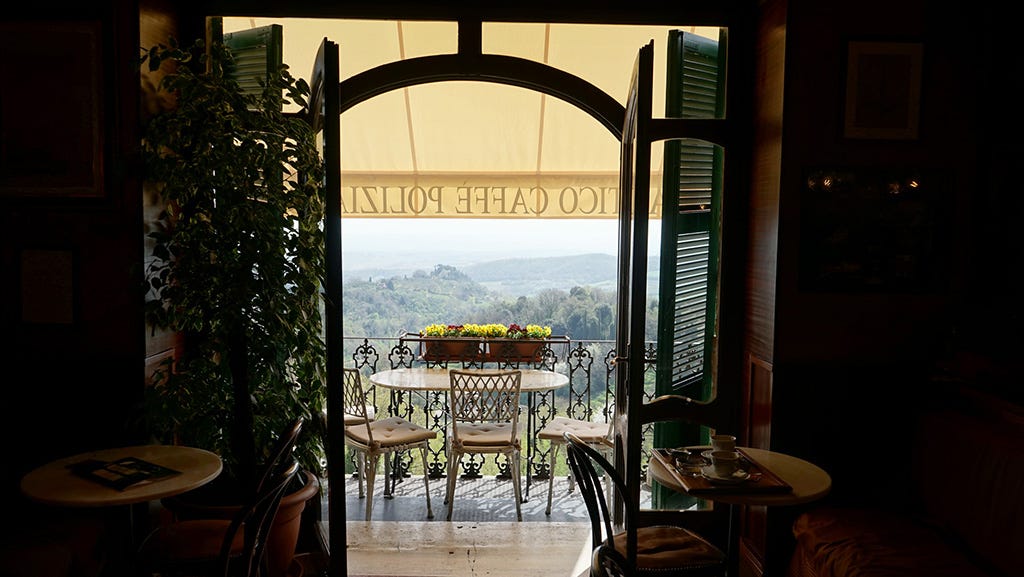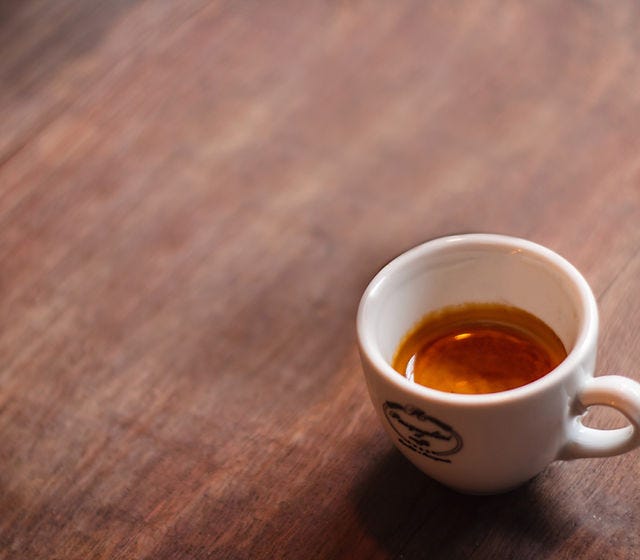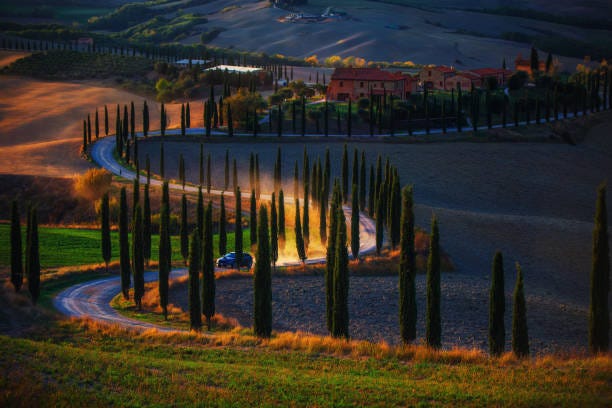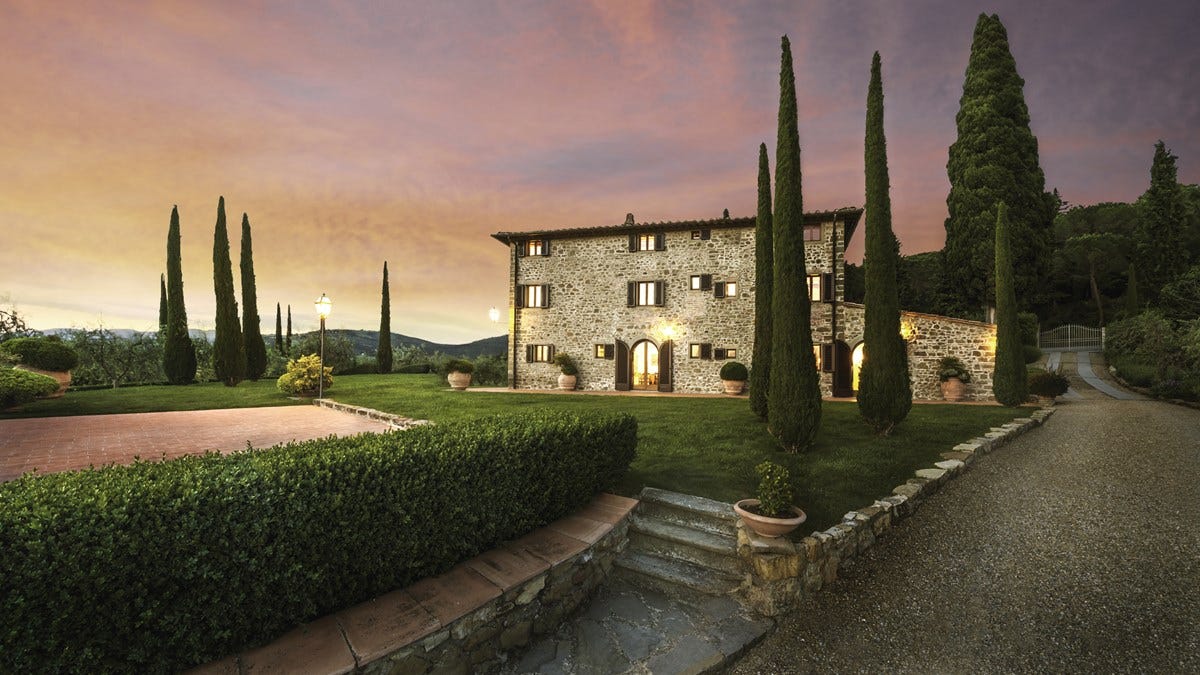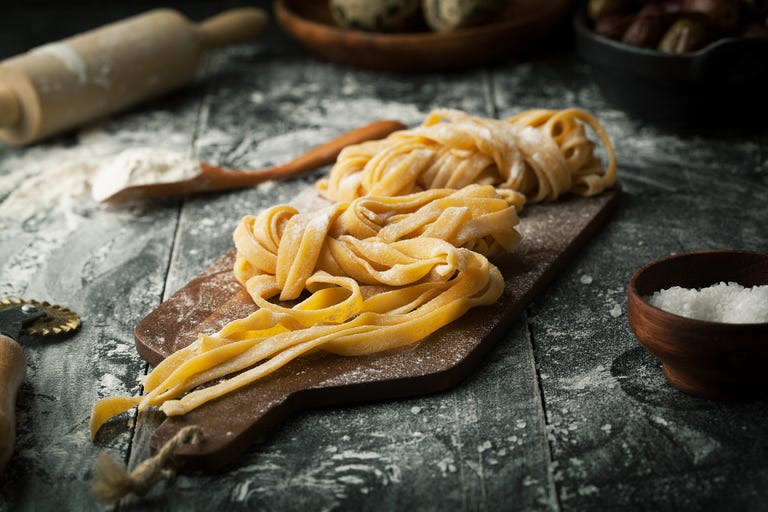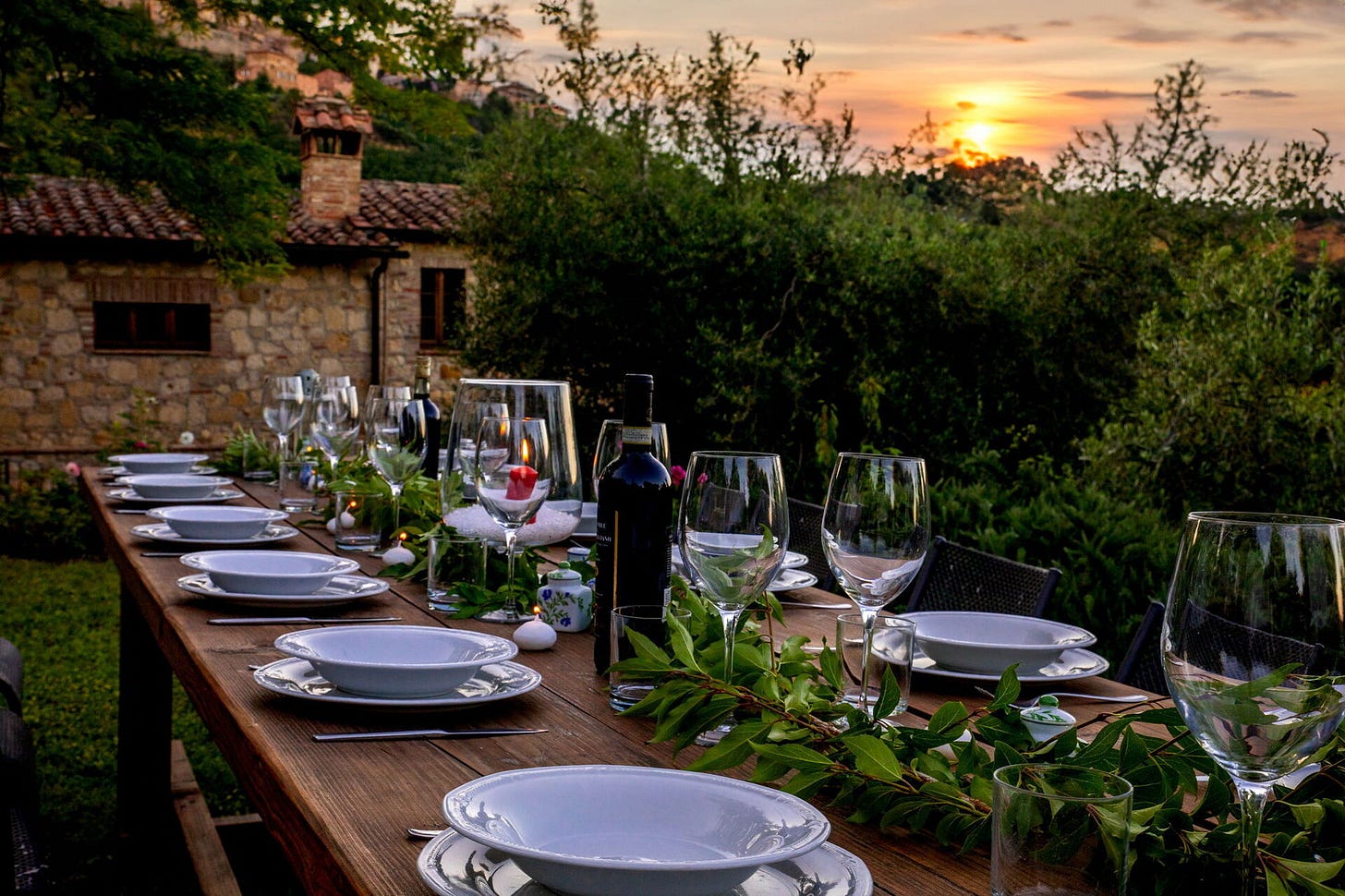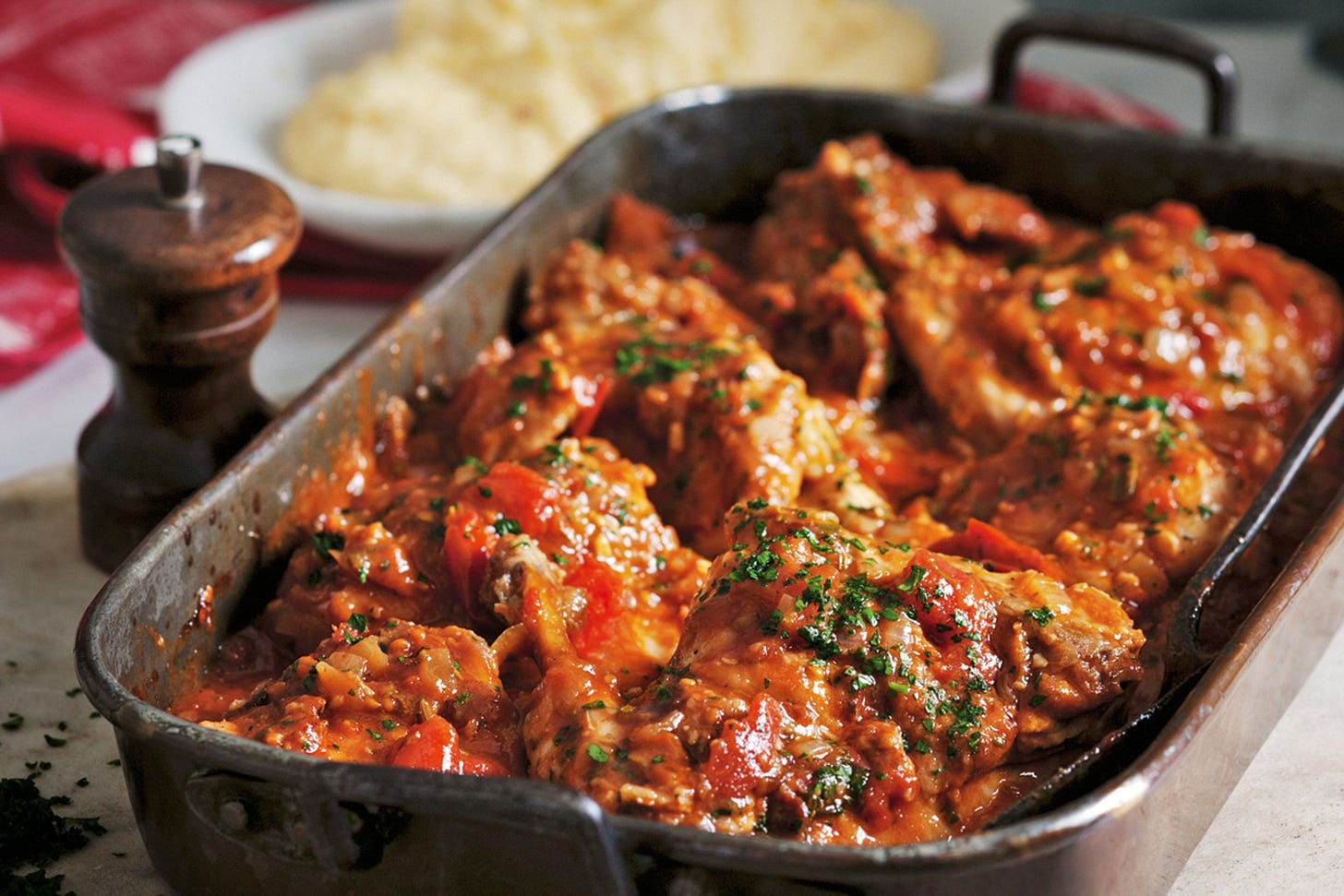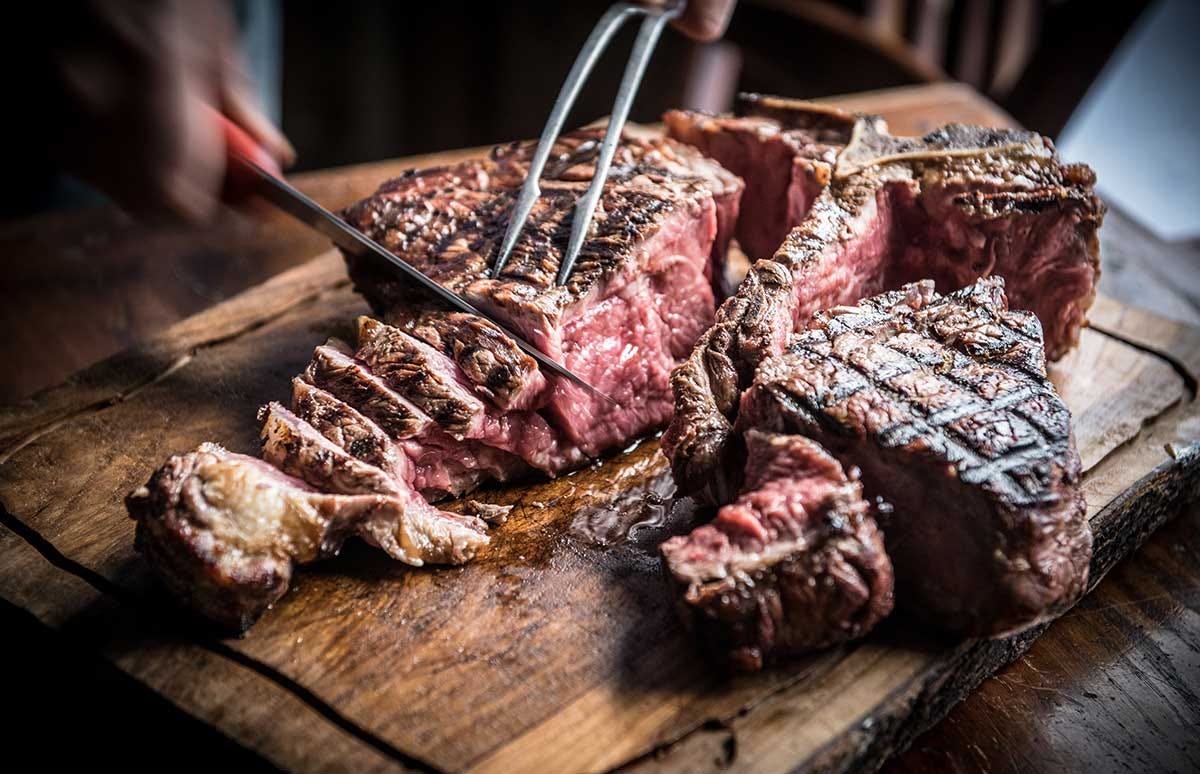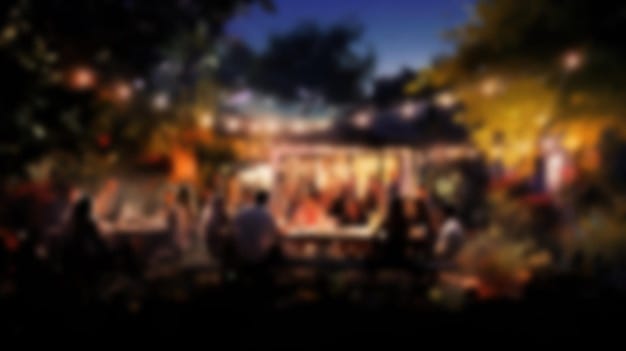The Secrets Of Montepulciano And A Special Invitation To A Winemakers Dinner
Under the vast wine country sky, in a vineyard in Tuscany, surrounded by the warmth of newfound friends and family and the aromas of an epic meal that was arguably the greatest experience of my life.
The early morning sun was just beginning to cast its golden glow over Montepulciano, painting the ancient stone buildings with a warm, honeyed light. I walked along the cobblestone streets in the early morning silence. The air was crisp and wet, carrying the faint scent of vineyards and olive groves that surround this magical town. This was Tuscany in its purest form, an intoxicating blend of history, culture, and the promise of culinary surprises at every turn. The town was still stirring from its slumber, and I relished this rare moment of solitude. No tourists. Just locals starting their day. Shopkeepers were rolling up shutters, their movements unhurried, as if time itself had a different rhythm here. The sounds of espresso cups being stacked and readied bounced from a nearby café as I could hear the steam of the espresso machine chugging rhythmically. I could smell rich, dark coffee as I walked by. It filled my senses, waking me from my morning grogginess and was a perfect companion to the cool morning air.
I wandering with no direction but forward entering the Piazza Grande, the beating heart of Montepulciano and arguably one of the most beautiful piazzas in all of Italy. The square was surrounded by Renaissance architecture that seemed almost too grand for such a small town. The Palazzo Comunale stood proudly, its clock tower reaching for the sky. I stopped and felt the cold rock against the palm of my hand and imagined the stories these stones could tell, of medieval markets and grand proclamations, of the ebb and flow of life over the centuries, of tourists, of wanderers and of the countless photos taken here.
The narrow streets led me ever upwards, offering glimpses of the rolling Tuscan countryside that begged me to never look away. Vineyards stretched out in neat rows, a patchwork of greens and golds under the early morning sun. The landscape was almost too picturesque, too perfect. A living postcard that made me want to stop and savor the moment and never look away. It was a simple pleasure, an indulgence, away from chaos, away from modern life. I followed my nose, the scent leading me to a small bakery tucked away, hidden on a small side street. The aroma of fresh bread was irresistible, and I indulged in a warm, crusty cornetto that crackled delightfully with each bite. I strolled and broke portions off to nourish my soul, feeding myself the flavors of Italian culture and tradition. Here, food was a way of life, deeply rooted in tradition. A tradition of recipes, tastes, indulgences and community.
Slowly, reluctantly, the town opened itself to visitors as more tourists began to appear along the streets and in the piazzas, drawn by the allure of Montepulciano's architecture, wine and deep, rich history. Yet, even as the town buzzed with new energy, there was a sense of timelessness that constantly surround me. The locals went about their routines with a quiet dignity, unperturbed by the ebb and flow of visitors who filled the streets through the day and emptied them in the evening just as quickly. It was this balance of old and new, the blending of past and present, the juxtaposition of tradition and curiosity that made Montepulciano so intoxicatingly enchanting. Following the lead of two older men, sitting and enjoying their morning with an animated conversation, I took my own moment to sit on a stone bench, letting the sun warm my face and the town to douse me in its everlasting beauty. Around me, the ancient streets hummed with life, each path and alleyway a story just waiting to be discovered. It was easy to see why so many artists and writers had found inspiration here. In Montepulciano, every corner held a whisper of the past, a story just waiting to reveal itself to those that would listen.
The mid morning sun relentlessly beat down on the cobblestones around me, warming them like a stovetop ready to sear the soles off of unprotected feet. Slowly, methodically, I strolled up the Corso, the main artery of this medieval hilltop town. It was a gentle slope at first that lulled me into a false sense of security. But I wasn’t fooled. By the time I circled back to Piazza Grande, my calves were screaming, and I was questioning every life choice that led me to this moment. But in all honesty, every step, every climb was completely worth it. The narrow streets twisted and turned, revealing hidden gems at every glance. A weathered door frame here, an ancient coat of arms there. It was like walking through a living museum, only instead of "Do Not Touch" signs, I was happily greeted by the intoxicating aroma of fresh pasta and the melodic cacophony of rapid-fire Italian that made me want to stop and experience it all.
I passed by the Torre di Pulcinella, its clock face adorned with a bizarre puppet figure. It was as if some deranged Neapolitan bishop decided to leave his mark on this quintessentially Tuscan town. But who are we to judge? In a world of cookie-cutter tourist traps, even a little strangeness is always a welcome site. And to this day, no one knows why a Neapolitan symbol can be found here, although some believe that it’s actually a Renaissance masquerade mask, the “Mangia” from Siena. The facts, lost in time, shrouded in mystery are left to the observer’s perspective. I moved steadily, continuing my uphill battle, noticing the palazzi lining the streets. These weren’t your run-of-the-mill mansions These were the architectural equivalent of a middle finger to modesty, built by families so wealthy and powerful they made the Medicis look like small-time hustlers.
Finally, at long last, I circled back for a third time, and emerged yet again into Piazza Grande, gasping for air like a fish out of water. But the view was enough to make me forget the burning in my legs and the sweat staining my overpriced linen shirt. The square was a masterpiece of Renaissance urban planning and a perfect stage for the daily theater of Italian life. The summer heat drifted across the piazza, constantly thrumming, turning the travertine facades into blinding beacons of Renaissance glory. But surrounded by this incredible creativity, ingenuity and art, I couldn't give less of a shit about the architecture at the moment. What had me transfixed and captured every bit of my attention was the living, breathing circus unfolding before my very eyes. This was another reason that I decided to make my rounds through the city yet again into this gorgeous piazza.
The gelato guy, arms flailing like a conductor on meth described the day's flavors to wide-eyed tourists who struggled to take in every word and capture a hit of recognition of the flavors being offered. His enthusiasm was infectious, but I could see the weariness behind his eyes—the same look I've seen in line cooks at 2 AM after a brutal Saturday night service. Across the way, a group of leathery old men were engaged in what appeared to be a heated debate about fútbol, or politics, or maybe just whose knees were giving them more grief. It was also quite probable and in all likelihood that these two old men have been having the same argument in the very same spot for the last 50 years.
A watched a mother who chased her hellion of a toddler across the piazza as he made a beeline for the fountain, determined to take an impromptu bath. Meanwhile, the local shopkeepers leaned in their doorways, taking in the spectacle with a mix of amusement and resignation. This was their daily bread and butter - the chaos of visitors colliding with the steady rhythm of small-town life. And me? I was content to sit here soaking it all in like a voyeuristic sponge. Dear reader, I could tell you this with absolute certainty and mental clarity. You could channel surf through hundreds of cable channels, you could flip through dozens of YouTube subscriptions, you could scroll through countless Instagram reels, and none of them, not a single one would be better than anything in front of me at this moment. No show on TV, no video online could match the utter beauty and the bewildering urban chaos which was, at this moment, the best entertainment on earth.
I stepped onto Via di Voltaia Nel Corso, the ancient cobblestones beneath my feet continued to whisper the tales of centuries past. Montepulciano, that jewel of Tuscany, sprawled before me like a Renaissance painting come to life. The morning sun that cast long shadows across the weathered facades, now hung high in the sky and left no corner to the imagination. I meandered along the street and I found myself in no particular hurry to be anywhere but here. As the day grabbed me by the nose and simply led me forward, so to did the aroma of freshly roasted coffee beans that pulled and lured me like a siren's song to the doorstep of Caffè Poliziano. This cafe wasn't some cookie-cutter Starbucks bullshit. This was the real deal—a place where espresso wasn’t just a caffeine delivery system, but a goddamn art form. I walked upstairs and settled into a worn leather chair, the kind that's seen more asses than a proctologist's office. I collapsed onto the soft leather letting the heat just ride over me while I proceeded to order an espresso. A hot espresso on a hot scorching day you say? Well, the answer is really as simple as you would imagine it to be, because when in Rome— or in this case, Montepulciano, you just do as the locals do. And trust me, you will like it. The waiter brought me a thimble-sized cup of liquid gold, strong enough to wake the dead and smooth enough to make me question why I ever settled for that watered-down swill back home. The espresso, as it was expected, was dark as sin and twice as tempting.
I savored the coffee slowly, the blissful caffeine pumping into my bloodstream, and dreamily contemplated my next move. The logical choice, of course, would have been to visit one of the many historic wine cellars, to sample the famous Vino Nobile di Montepulciano. But logic be damned—I was on vacation, and it was barely past noon. And just to show how much of a local I could be, I ordered another espresso and another cornetto, because if there's one thing that Italians understand, it's that espresso was welcome and an acceptable food at any hour of the day. I savored that first bitter sip coated in caramelized sweetness and gazed longingly out at the Tuscan landscape. Rolling hills dotted with cypress trees and vineyards stretched to the horizon warming my senses and my nostalgia for this amazing town. It was the kind of view that pulled you in, kept you captive and never wanted to release you from its grasp.
I was brought out of my view porn suddenly, as a distinguished gentleman, silver-haired and impeccably dressed, nodded to the empty chair across from me. "Posso?" he asked. Who was I to refuse? This of course wasn't Any City USA, where personal space was guarded more fiercely than Fort Knox. This, my friends, was Italy, where strangers become friends over a shared bottle of wine, coffee or slow afternoon meal. He pulled up a chair and ordered his own espresso with one finger held aloft and a nodding smile towards the server. It’s an amazing thing to witness. Locals just know. No one, and I mean NO ONE will order a cappuccino after eleven o’clock in the morning anywhere in Italy. Unless, of course, you are a tourist, and then they know, giving you a stern look, but oblige you anyway. But this, this was the silent request. The knowing “one finger” that placed an order that was instantly understood by every Italian. And was at its best, a cultural bond that was forever forged and always present.
My new coffee companion and I fell into an easy conversation, the kind that only seems to happen in places where time moves just a little bit slower. I instantly realized who he was the moment he introduced himself. And, you would as well, if you happened to be a lover of one of the best Montepulciano bottles in the region. He spoke of his nonna's ragù, simmered for hours until the meat practically dissolved. Of Sunday lunches that stretched well into the evening, fueled by homemade wine and raucous laughter. “Cibo,” he said, gesturing expansively, “Food…is the thread that binds us all together." And wasn't that the goddamn truth? In a world of division and chaos, a shared meal was still the great equalizer. Whether you're dining on white truffles or a greasy slice of pizza, breaking bread with another human being was always a sacred act. It was a simple way to lower your defenses, to share culture and flavor while bonding with another person in the best way possible. He regaled me with tales of harvesting olives and wine grapes with his children, of teaching his granddaughters and grandsons the secrets to preparing perfectly al dente pasta. While his wine remained the ever-present instructor in the cucina. Every story we managed to tell was centered around food. But here in Italy, it was a way of life and a connection to the land and to each other as well.
The afternoon light began to soften, painting the town in shades of gold and amber. I suddenly realized that we had been sitting here for hours, drinking espresso, pellegrino and just chatting the minutes away which were seemingly nonexistent. My new friend drained the last of his espresso, turned to me and surprised me in the best way possible. "You must come to dinner tonight," he said. It was not really a question or request but rather a statement of fact and sounded somewhat like an order and expectation. "My wife is making a small dinner, and you must taste her meal and my wine. I will send a car for you at 18:00. Cena.. Dinner is at 20:00. And, you will help cook.” He smiled genuinely, pleased that I accepted his gracious invitation. We shook hands and I realized that I had grinned like an idiot. But, in reality, who was I to refuse such a generous and unexpected invitation? I was touched and overwhelmed with gratitude knowing I was about to experience the kind of meal that changes a person forever. Not just because of the food, but because of the company, the setting, the entire fucking gestalt of it all. It was the experience, and the transformative power of a meal shared with strangers in a strange land.
The sleek black car left Montepulciano and snaked its way through the narrow country roads of wine country carrying me to my dinner adventure. I was excited but also felt like I was in some sort of culinary spy thriller. My driver, a stoic Italian with a perfectly pressed suit, hadn't uttered a word since picking me up. His silence only added to the air of mystery surrounding this clandestine rendezvous with a winemaker whose name shall forever remain unspoken. The ancient hilltop town faded in the rearview mirror as we plunged into the Tuscan countryside. Rolling hills covered in neat rows of vines stretched out in every direction, punctuated by the occasional cypress tree standing sentinel over the landscape. It was like driving through a Renaissance painting as the evening settled in around us.
We wound our way along the backroads and as the car turned and veered, I wondered what I had gotten myself into. And just as my imagination started running wild with visions of underground wine caves and robed secret societies, we rounded a bend and there it stood brightly lit in the Tuscan dusk—a villa that would make even the most jaded traveler stop and stare with silent admiration. Stone walls weathered by centuries of sun and wind, terracotta roof tiles, with a view that stretched all the way to eternity. This, my friends, was the real fucking deal. But, before I could even catch my breath, the car door flew open and I was engulfed in a tsunami of Italian hospitality. The winemaker's family descended upon me like a flock of well-dressed, overly affectionate pigeons. There were kisses on both cheeks, rapid-fire Italian that my high school language classes hadn't prepared me for, and more hand gestures than a Scorsese film. I was engulfed.
But in the midst of the chaos, the seemingly endless introductions, the laugher and the struggles of meeting every single person, I locked eyes with the family's nonna. She was a tiny woman, barely five feet tall, but she moved with the authority of a five-star general. With a look on her face that instantly said "I've seen some shit," she deftly maneuvered through the crowd and before I knew it, I was hugged vigorously, kissed on both cheeks, and somehow found myself wearing an apron that smelled faintly of garlic and decades of Sunday dinners. The nonna's iron grip on my arm left no room for argument as she steered and walked me towards the kitchen. It was a space that would make most professional chefs never want to leave—gleaming copper pots, marble countertops, and a wood-fired oven that looked like it could roast an entire pig.
I crossed the threshold of tile and wood as the familiar aromas of garlic, tomatoes, and fresh herbs hit me like a freight train of nostalgia and longing. This kitchen was a time machine, transporting me back to every Italian grandmother's house I'd ever had the pleasure of eating in. Pulling me into the Italian cooking magazines that I used to thumb through in my youth as I marveled and stared at the gorgeous kitchens that were the size of most people’s entire homes. The General, the Fearless Leader, the impeccable nonna wasted no time putting me to work. Suddenly, before I even had time to orient myself, a wooden board appeared in front of me, along with a mound of flour and eggs. The message was clear, the stare was intense and authoritative: we were making pasta from scratch, and God help me if I fucked it up.
She stood by me in support, sharing her secrets as I kneaded the dough, trying desperately to mimic her effortless movements. It took every ounce of self control not to look up, because when I snuck a peek, I marveled at the scene unfolding around me. The winemaker's wife was at the stove, stirring a pot of what smelled like the world's most amazing ragu. Daughters and sons all moving in a rhythm that showed that they had practiced this choreography before as they crafted the evening’s feast. Grandchildren darted in and out, snatching pieces of cheese and salumi when they thought no one was looking, ravaging a charcuterie board that seemed to just keep replenishing itself magically. Instantly, I found a glass of the greatest Montepulciano that I had ever tasted, aged and decanted perfectly, poured with love and expertise standing in front of me, the aroma of spice, pepper and blueberries slapping me in the face. It was the perfect chef’s appetizer to meal prep and kitchen commotion. I could see the disapproval in the nonna’s eyes as she hurriedly ushered her husband out of the kitchen with his decanter, waving her arms and sending him off with rapidfire Italian, which I could only assume was a formal reprimand for contributing to the tipsiness of the sous chef during the course of the meal prep. Through the kitchen window, I could see the winemaker return to tending a grill that was pluming volumes of smoke out into the dusk. The smell of charring meat mingled with the aroma of fresh herbs and garlic created a symphony of scents that made my stomach growl in desperate anticipation. The kitchen was a blur of activity. Bottles of wine appeared and disappeared with alarming frequency. Laughter echoed off the stone walls, punctuated by the occasional shouted instruction from the nonna. It was organized chaos, a militaristic hierarchy, but kind of beautiful, and only happened when food, family, and tradition came together in the most perfect of harmonies.
By the time we sat down to eat, the sun was already setting over the Tuscan hills and the vineyards stretching far into the horizon. The sky exploded in painted colors as shades of orange, pink and purple that no camera could ever do any justice smeared and trailed overhead. We all gathered around the massive wooden table, the air thick with the aroma of good food, amazing wine and uproarious laughter. It was the excitement and chatter that only came before a meal you knew would be absolutely unforgettable. I looked around the table, marveling at these incredible people who had welcomed me into their home like a long-lost relative. The corks continued to be popped and glasses were filled from one reserve bottle after another as my host generously brought bottle after bottle up from his private cellar. I sat in awe as I silently toasted to the anonymous winemaker and his family. This amazing group of people had given me an experience, a family style meal and a deep glimpse into the soul of Italy. I took another long, luxurious sip of that nameless, perfect wine, and I knew that no matter where my travels took me, a part of me would always be right here, in this kitchen, with flour on my hands and the taste of Tuscany on my lips.
I found myself wedged between the winemaker and his wife, a formidable pair whose hospitality knew no bounds. The wife, the General, the nonna, kept pinching my cheeks like I was some kind of prized tomato, apparently impressed by my fumbling attempts to help in the kitchen earlier in the evening. Mounds of antipasti appeared, the magically refillable charcuterie boards, a glorious bastard child of excess and simplicity. Local cheeses that could make even a Frenchman dive in hungrily, paired with wild berry compote and honey that tasted like it was stolen from the gods themselves. Handmade croutons the size of small continents were placed on the table around the boards, each a canvas for culinary artistry. Pâté that could seduce a vegetarian, artichokes and meat locked in an unholy alliance, mushrooms that whispered of dark forest floors, and a concoction of red cabbage and cream that shouldn't work but absolutely fucking did. Slices of prosciutto, thin enough to read through, melting on the tongue like piggy cotton candy. Salami that could make your cardiologist reach for their prescription pad. And let's not forget the lardo – those gossamer-thin slices of pure, unadulterated pork fat, glistening like opal in the fading light all made their way to the table to be shared, enjoyed and devoured.
The entire family chattered and laughed, a medley of Italian and English, mostly for my understanding, washed over me like a warm wave. No one checked their phones. Absolutely no one was in a hurry. Time seemed to stretch and slow, as if the wine and food had somehow bent the laws of physics and made this house, this backyard, this table immune to the passing hours. Speaking of wine, it flowed like water—if water could make you see God after a few glasses. Our host, the winemaker, kept my glass perpetually full, as if letting it empty would bring shame upon his ancestors or his reputation. I was only too happy to oblige. I found myself savoring glass after glass of this most exquisite Montepulciano that I had never tasted before. Each pour was a revelation, a deep, ruby elixir that spoke of sun-drenched vineyards and the loving hands of the winemaker, who by the way was sitting to my right and knew his craft like a mechanic knew his well oiled and well running engine. And to rub it in even more, every single bottle was from his private reserve which had not seen the light of day for many, many years. It an honor bestowed upon few, and with every sip, the wine unfolded stories of the land, of toil and tradition, swirling around my senses with a complexity that was both humbling and intoxicating. Bottle after bottle, time seemed to slip away, leaving only the moment—a celebration of life, of passion, and the undeniable magic of sharing something truly extraordinary.
The sky darkened even more in this late Tuscan evening. The strands of piazza lighting illuminated the lush backyard in a warm glow over our feast. The food continued to arrive, plate after heaping plate. The primi, a rabbit risotto that could make you forget every other rice dish you've ever had in your entire life. Rich, creamy, and with chunks of tender rabbit that had clearly lived a life of luxury before graciously sacrificing itself for our pleasure. Heaping, generous portions of homemade gnocchi that I learned to gently roll myself in the kitchen behind my shoulder, under the house nonna’s stern instructions. Little pillows of potato perfection that I'm pretty sure were from a recipe that had been handed down by several generations of amazing nonnas in this family. The gnocchi was so light, and so fluffy, that they practically floated off the plate and into my mouth, leaving me to wonder if I'd died and gone to carb heaven.
Mounds of pasta appeared, serving after generous serving. Earlier, I'd stood in the kitchen, sweating bullets as the family nonna barked instructions at me in rapid-fire Italian, correcting my movements and technique as I smiled and tried not to look like a complete idiot in her kitchen. Somehow, miraculously, I had managed to produce something edible and even received a stern nod of satisfactory approval from her as well. A compliment I was told in a whisper by her daughter that was generally never given easily. Now, seeing it on the table in front of everybody, I felt a surge of pride that washed over me as I watched everyone digging in, sharing stories and laughing with one another. Course after course continued to be brought out, each one a testament to the simple genius of Tuscan country cuisine. Nothing fancy, nothing pretentious—just good, honest food that spoke of the land. the people who worked it and amazing recipes that were made with skill and love.
The secondi brought a parade of meats that would make a vegan weak in the knees. Succulent roasts, perfectly grilled steaks, and slow-cooked dishes that had clearly been simmering since the Renaissance. The source of all of that billowing smoke that I had witnessed in the kitchen, which was flowing all evening long outside from the outdoor grills, finally made its way to the table in front of us. The Bistecca alla Fiorentina arrived at the table like a reverent offering to the gods of culinary indulgence. This hulking slab of Chianina beef, grilled to a perfect char on the outside while maintaining a blood-red center, commanded immediate respect and attention from everyone as the winemaker carved the slab of meat at the table right under our noses. The crust was a symphony of caramelized fat, the sea salt crackled under his knife, giving way to a tender, velvety interior that promised an experience akin to a religious epiphany. Each bite burst with the primal, earthy flavors of the region, a testament to the simplicity and purity of Italian cooking. It was a dance of smoke and meat, a reminder that sometimes, perfection lies in doing very little—just letting the quality of the ingredients and the skill of a true artisan shine through. Paired with a bottle of my host’s personal reserve, and it transformed into its own story of heritage and passion. It was in a word, fucking sublime.
Throughout the entire evening, the family that welcomed me so warmly kept eating, drinking, and laughing. Toasts were made for everything and for nothing all. Sometimes, it’s a pleasure to say thank you for the “just because”. I caught maybe one word in ten, but it really didn't matter. The warmth and the joy that I witnessed were universal languages and were understood and felt by all. My stomach stretched to previously unknown dimensions as the mounds of food on the table continued to appear and disappear all evening long as I found myself in a state of a blissful food coma. I was full. I was happy. But, not just physically. I was happy emotionally as well. This dinner was a celebration of family, of food, of friendship and of kindness. Looking around the table at these strangers who had welcomed me like a long-lost relative, I had suddenly become a welcome guest, a friend and part of the family, sharing in the experience, sharing in the food, and sharing in a meal. This dinner was not about the fancy plating or the Michelin stars. In fact, it was much better than all of that. This was the simple act of breaking bread together, of laughing, of talking, of experiencing flavors and combinations together, of building friendships and in turn becoming family.
The conversations flowed, the wine was poured and enjoyed, the songs of the evening crickets were punctuated by bursts of laughter and the clinking of glasses. Stories were told, jokes were cracked, and even though I understood only a fraction of what was said, I felt like I was part of something unique, something special, and something truly extraordinary. I even earned another cheek pinching embrace from my hosts wife, yet again. The nonna who rarely gave out compliments commended me on being able to listen well to her every instruction. I was therefore told to relax with my winemaker host who sat next to me as we gazed at the stars, commented on the evening’s food and enjoyed the experience of the night. The last plates were cleared and espresso was served (because apparently, there's always room for coffee), I sat back in my chair, stretched my legs, and took it all in. The twinkling lights, the remnants of this family’s incredible feast, and the contented faces around the table all swirled into one glorious evening. Children ran through the yard and played, conversations continued, and music played gently as the night’s accompaniment. In that moment, under the vast wine country sky, in a vineyard in the middle of Tuscany, surrounded by the warmth of newfound friends and the lingering aromas of an epic meal that was arguably the greatest experience that I had ever had, I was humbled beyond measure. I was thankful to my host and his family for the invitation and the loving welcome to join them that evening. This day, this evening, this moment, was the best part of life. There was kindness, there was laughter, there was love and there was friendship. And I felt like one lucky bastard who was just fortunate enough to be invited to it, to taste it, to experience it, if only for one perfect evening. Tonight, we created a shared memory and friendship that would truly last a lifetime.






